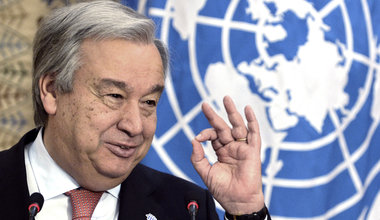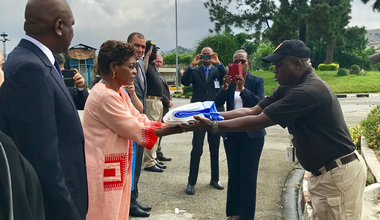UNOCI HELPS IVORIAN POLICE IMPROVE EXPERTISE IN CRIME INVESTIGATION
Abidjan, 3 November 2009... 20 police officers from the crime investigation unit of the Ivorian police on Tuesday received their certificates at the end of a training programme on fingerprinting and crime-scene investigation, organised by the United Nations Operation in Côte d'Ivoire (UNOCI).
For two weeks, the police officers took part in basic training in evidence-gathering techniques, collecting fingerprints and how to look for signs and evidence at a crime scene. The knowledge acquired during the training is to help them improve the crime investigation skills.
UNOCI's Deputy Police Commissioner, Pierre André Campiche, stressed the importance of respecting human rights while investigating a crime scene and urged the trainees to master the art of searching for proof in order to better carry out an inquiry and to help them change their mentality. "To force an admission of guilty from a suspect by violence is not respecting human rights; it is better to present him instead with irrefutable proof of his guilt,'" said Mr. Campiche. He then called on participants to make the forensic police department, one of the indispensible services of the Ivorian Police, through their skills on the ground.
UNOCI has provided help to the forensic police department since it was set up in 2007, through training programmes, raising funds, soliciting donations of teaching materials and the rehabilitation of its facilities namely the Legal Medical Institute.
The Deputy Director-General in charge of the forensic police, Godrain Kouadio Roger, noted with satisfaction the ongoing assistance that the UN Mission had given to his department. "This is what explains the fact that so many police officers now want to join the forensic police," he said, adding that he was proud to hear his officers are now being referred to as "experts" outside.
The Director of Judicial Identification, Bah François, called on participants to use the knowledge they have acquired to fight crime effectively by adding irrefutable proof to criminal procedures.
Speaking on behalf of the trainees, chief police sergeant, Moussa Diakité, thanked UNOCI and their chiefs, and assured them that they had retained a lot during the course. Nevertheless, Mr. Diakité pleaded for more courses to help them complete their knowledge. "The time was short and we would like to become true experts," he added.
After the two-week practical and theoretical course, carried out by Ivorian trainers and two UN Police experts, the officers are going to share their experience with their colleagues who have not yet taken part in the training.
 UN
UN United Nations Peacekeeping
United Nations Peacekeeping



